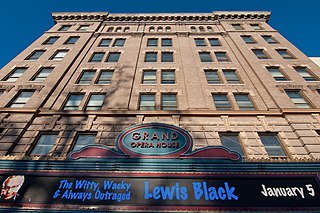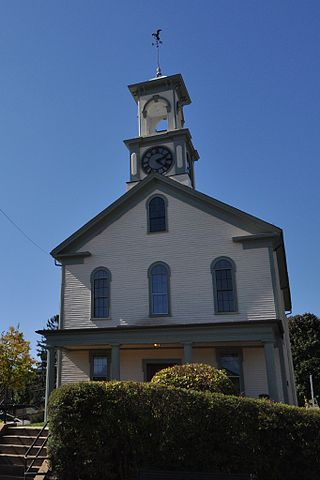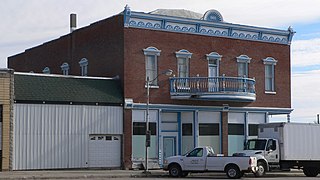Related Research Articles

The Grand Opera House, often called The Grand and originally known as the Academy of Music, is a historic opera house located in Macon, Georgia, United States. Listed on the National Register of Historic Places in 1970, it is now the performing arts center of Mercer University.

Sunnyside Gardens is a community within Sunnyside, a neighborhood in the New York City borough of Queens. The area was the first development in the United States patterned after the ideas of the garden city movement initiated in England in the first decades of the twentieth century by Ebenezer Howard and Raymond Unwin, specifically Hampstead Garden Suburb and Letchworth Garden City.

The Abbeville Opera House, also known as the Abbeville Opera House and Municipal Office Building is an historic building located in Abbeville, South Carolina. Designed by William Augustus Edwards of Edwards and Wilson, it was opened in 1904 and dedicated in 1908. On July 1, 1970, it was added to the National Register of Historic Places.

The South Meetinghouse is a historic ward hall at 260 Marcy Street in Portsmouth, New Hampshire. Completed in 1866, it is one of the city's finest examples of Italianate architecture, and a rare surviving example of a 19th-century ward hall. The building was listed on the National Register of Historic Places in 1982. It continues to be used as a community resource.

Claremont City Hall, also known as the Claremont Opera House, is located at 58 Opera House Square in the heart of Claremont, New Hampshire, United States.

The Allenstown Meeting House is a historic meeting house on Deerfield Road in Allenstown, New Hampshire. Built in 1815, it is New Hampshire's only surviving Federal-style single-story meeting house to serve both religious and civic functions. It was listed on the National Register of Historic Places in December 2004, and the New Hampshire State Register of Historic Places in July 2004. It is presently owned and maintained by the town.

The Leicester Meeting House is a historic church building at the junction of United States Route 7 and the Leicester-Whiting Road in the center of Leicester, Vermont. Built in 1829, it is a well-preserved example of vernacular Federal period church architecture executed in brick. It was listed on the National Register of Historic Places in 1988.

The Fletcher Union Church, also known as the Fletcher Community House, is a historic former church building on TH 1 in Fletcher, Vermont. Built in 1871, it is one of only a few public buildings in the small community, and has for over a century been a secular community meeting space. It was listed on the National Register of Historic Places in 1982.

Edgerton Park, also known as the Frederick F. Brewster Estate, is a 20-acre (8.1 ha) public park on Whitney Avenue, straddling the New Haven–Hamden town line in Connecticut.

The IOOF Opera House in Hampton, Nebraska, United States, is a 40-foot (12 m) by 65-foot (20 m) building that was built in 1880 and was leased to the International Order of Odd Fellows (IOOF) chapter in 1893. In 1988, when it was nominated for the National Register of Historic Places, it was the only two-story building in the retail business area of Hampton.

The Sellwood Branch YMCA, also known as the Sellwood Community Center, in southeast Portland in the U.S. state of Oregon, is a 2.5-story structure listed on the National Register of Historic Places. Built in 1910, it was added to the register in 2006.

The Tecumseh Opera House, located at 123 S. Third in Tecumseh, Nebraska, is a historic building built in 1880. It is a two-part commercial block building, and has also been known as Seaver Bros. Opera House, as Smith Theatre, as Hahn Opera House, as Spicknall & Goodman Opera House, as Goodman & Canfield Opera House, and as Villars Hall, and it has been denoted NeHBS #J007-53 and OHBIN #ll-29-OI.

Clem's Opera House, at Main and Post Sts. in Gresham, Nebraska, is a building constructed in about 1891. It has also been denoted NeHBS #YK04-1 and OHBIN #03-01-02.

The Colton Carnegie Library is a Carnegie library located at 380 North La Cadena Drive in Colton, California. The library was built in 1908 through a $10,000 grant from the Carnegie Foundation. Architect Franklin P. Burnham designed the Neoclassical building, the only example of the style in Colton. The building features an entrance portico supported by Ionic columns, a frieze and ornamented pediment above the entrance, and pilasters at the corners. In addition to housing the city's collection of over 1,000 books, the library hosted community meetings and social groups and even served as a church. The library moved to a larger building in 1982, and the building now houses the Colton Area Museum.

The Rockingham Village Historic District encompasses the traditional village center of the town of Rockingham, Vermont. Settled in the 18th century, the district, located mainly on Meeting House Road off Vermont Route 103, includes a variety of 18th and 19th-century houses, and has been little altered since a fire in 1908. It notably includes the 18th-century National Historic Landmark Rockingham Meeting House. The district was listed on the National Register of Historic Places in 2008.

The Litchfield Opera House is a community building in Litchfield, Minnesota, United States, listed on the National Register of Historic Places for its significance to the community. A committee of businessmen organized in 1899 with the intention of providing a place to hold meetings and theatrical performances. The previous town hall, built in 1871, was obsolete. The government of Litchfield Township, Minnesota paid for construction of the building, which was designed by architect W.T. Towner and built by N.P. Franzen. The city bought the building from the township in 1911. The opera house was listed on the National Register of Historic Places in 1983.

The Fromberg Opera House, in Fromberg, Montana, was built in 1907. It was renovated to serve as the American Legion Hall in 1940. It was listed in the National Register of Historic Places in 1983.

The Women's Civic Improvement Clubhouse, at 59 Winburn Way in Ashland, Oregon, was built during 1921–22. Its construction was funded by the Ashland Women's Civic Improvement Club and the philanthropy of Jesse Winburn. It was listed on the National Register of Historic Places in 1989.

The Schneider Opera House is a historic building in Snyder, Nebraska. It was built as a two-part commercial block building in 1900 on land formerly owned by Conrad Schneider, Snyder's founder. According to the National Register of Historic Places form, "This opera house is significant in the area of social history because it gave Snyder a neutral, nonaffiliated location for political meetings, church bazaars, community parties, high school graduation, and box socials. [...] In the days before radio, television, and sound movies, activities at the opera house were anticipated for days or weeks' ahead of time." The building has been listed on the National Register of Historic Places since September 28, 1988.

The T. M. Callahan House, also known as the ‘’’Sweeny-Callahan House’’’, at 312 Terry St. in Longmont, Colorado, is a large Queen Anne-style house built in 1892 and expanded in 1897 and 1908. It was listed on the National Register of Historic Places in 1985.
References
- 1 2 "National Register Information System". National Register of Historic Places . National Park Service. July 9, 2010.
- 1 2 John Rau (September 8, 1988). "National Register of Historic Places Inventory/Nomination: Garden City Opera House". National Park Service . Retrieved March 11, 2018. With three photos.
